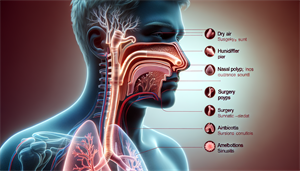
Decoding the Squeaky Sounds from Your Nose
The symphony of sounds our bodies produce is truly fascinating, from the rhythmic beating of our hearts to the soft whisper of air passing through our lungs. But what about the squeaking sounds that occasionally emanate from our noses? What could possibly be behind this intriguing auditory phenomenon? The answer lies in the mechanics of our nasal passages and the key role they play in our respiratory system.
The nasal cavity, with its intricate network of bones, tissues, and blood vessels, not only filters and warms the air we breathe but also serves as the stage for these peculiar sounds. Obstructions or structural issues can turn this stage into a concert hall for nasal noises, producing the phenomenon we often refer to as a nose whistle.
The Mechanics of Noisy Breathing
Consider the mechanics of noisy breathing akin to a gust of wind sweeping through a narrow alleyway. This wind, interacting with the surrounding architecture, causes a whistling sound. In the same manner, air pressure flowing through your nasal passages can emit a squeaking sound upon encountering obstructions or irregularities. These obstructions could be a result of mucus buildup, a common consequence of a cold or allergy, or due to a structural issue, such as a hole in the nasal septum, also known as a septal perforation. This perforation could occur due to an injury or following a rhinoplasty, a surgical procedure performed to reshape the nose.
The inadvertent removal of excess cartilage or internal nasal lining during the procedure can create a hole in the septum, leading to the infamous nose whistle.
Unraveling the Role of the Nasal Cavity
Nature’s design marvel, the nasal cavity, plays a significant role in our respiratory system by humidifying and warming the air we inhale for our lungs’ comfort. However, obstructions or structural problems can cause air trapped in the nasal cavity, leading to the production of nose whistles.
The nasal cavity is composed of: Bones, Tissues, Blood vessels, Nerves. Collectively, these define the space inside our nose. It’s a meticulously designed system, where even the slightest alteration or obstruction can disrupt the smooth flow of air, leading to the creation of various sounds, including the squeaking sound we are dissecting.
Pinpointing the Causes Behind Nasal Squeaks
With a basic understanding of the nose whistle’s mechanics, let’s delve deeper to identify the root causes of these peculiar sounds. Several factors, including allergies leading to nasal congestion and structural issues like a deviated septum, can contribute to nasal squeaks.
Allergies are notorious for triggering nasal congestion, which can lead to mucus buildup and subsequent squeaking sounds. Structural issues, such as a deviated septum or septal perforation, can also cause airflow irregularities, resulting in nasal noises. It’s essential to recognize that persistent nasal squeaks may be indicative of underlying conditions, including allergies, structural concerns, or sinus infections, and should be evaluated by a healthcare professional if symptoms are severe or continue beyond 10 days.
When to Seek Medical Attention
If you find yourself wondering, “Why is my nose making a squeaky noise?” and are experiencing persistent nasal noises, it’s crucial to consider seeking medical attention.
While non-invasive remedies like hydration, humidification, and saline solutions can provide temporary relief, long-term solutions like surgery or innovative procedures such as Vivaer Nasal Airway Remodeling may be necessary for persistent nasal noises.
Consulting a healthcare professional can help identify the root cause of the issue and determine the most suitable treatment plan for your specific condition.


